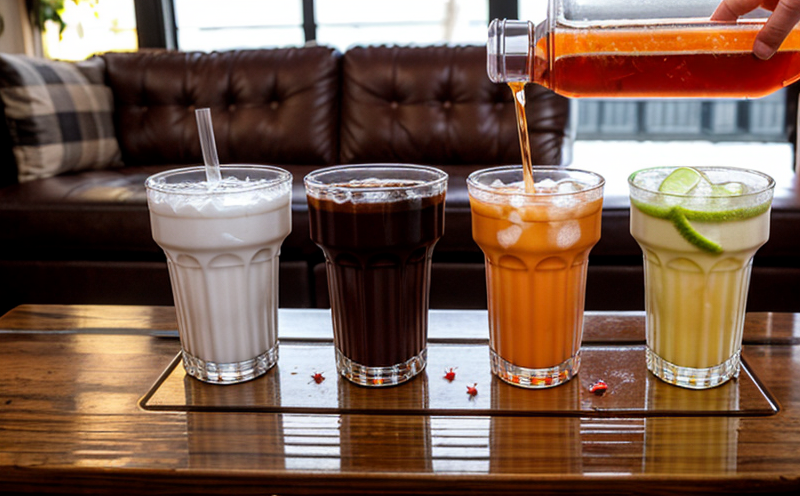EN 16877 Mycotoxin Screening in Juice Products
The European Standard EN 16877 provides a harmonized method for the screening of mycotoxins in juice products. Mycotoxins are toxic secondary metabolites produced by molds (fungi), which can contaminate various food and feed products, posing significant health risks to consumers.
Food safety is paramount, especially for beverages like juices that have a wide consumer base. Juice products, being highly perishable and prone to microbial contamination, are particularly vulnerable to mold growth leading to mycotoxin accumulation. This standard ensures consistent detection levels of these toxins across different juice types, thereby safeguarding public health.
The procedure outlined in EN 16877 involves extraction, clean-up, and analysis using liquid chromatography with tandem mass spectrometry (LC-MS/MS). It covers a range of mycotoxins including aflatoxin B1, B2, G1, G2; zearalenone; and ochratoxin A, among others.
The testing process begins with proper sample preparation. Juice samples are filtered to remove any particulate matter or sediment that may interfere with the analysis. Extraction solvents like methanol or acetonitrile are used to transfer mycotoxins from the sample matrix into solution form suitable for LC-MS/MS.
After extraction, the sample undergoes cleanup steps such as solid-phase extraction (SPE) cartridges to concentrate and purify the target analytes. This step enhances sensitivity by reducing matrix effects that could otherwise obscure detection signals.
The final step involves high-performance liquid chromatography coupled with mass spectrometry for quantitative analysis of mycotoxins present in the sample. The instrument detects the presence of each toxin based on its unique molecular weight and fragmentation pattern, comparing these against known standards.
- Methanol
- Acetonitrile
- Solid-phase extraction (SPE) cartridges
- High-performance liquid chromatography (HPLC)
- Tandem mass spectrometry (MS/MS)
Eurolab Advantages
At Eurolab, we pride ourselves on delivering accurate and reliable mycotoxin screening results. Our state-of-the-art laboratory facilities equipped with advanced LC-MS/MS instrumentation ensure precise detection down to the lowest permissible levels.
We employ highly trained technicians who adhere strictly to EU standards ensuring consistency in all our analyses. Our robust quality management system guarantees adherence to international norms like ISO 17025, thereby providing assurance that every test is conducted under controlled conditions.
Our extensive experience in food and feed testing enables us to provide comprehensive reports tailored specifically for your requirements. Whether you need basic compliance checks or detailed breakdowns of specific compounds, we offer flexible options suited to various business needs.
Environmental and Sustainability Contributions
- By ensuring food safety through rigorous mycotoxin screening, we help reduce waste associated with contaminated products. This minimizes environmental impact by preventing the disposal of potentially harmful materials.
- Our services contribute to sustainable agriculture practices by promoting better understanding and management of mold growth in crops used for juice production. This leads to more efficient resource use and reduced chemical treatments.
Use Cases and Application Examples
The application of EN 16877 is broad, encompassing various types of fruit juices such as apple, orange, grape, and cranberry. These beverages are popular worldwide but also carry higher risks due to their direct consumption without further processing.
Quality managers at beverage manufacturers rely on this service for regular testing during production processes. They use the results to implement corrective actions promptly if any contamination is detected early stages of production.
R&D engineers benefit from our services by gaining insights into potential sources and levels of mycotoxin contamination, which helps them develop safer products. Procurement teams can use these findings to select suppliers whose practices align with stringent quality standards.





